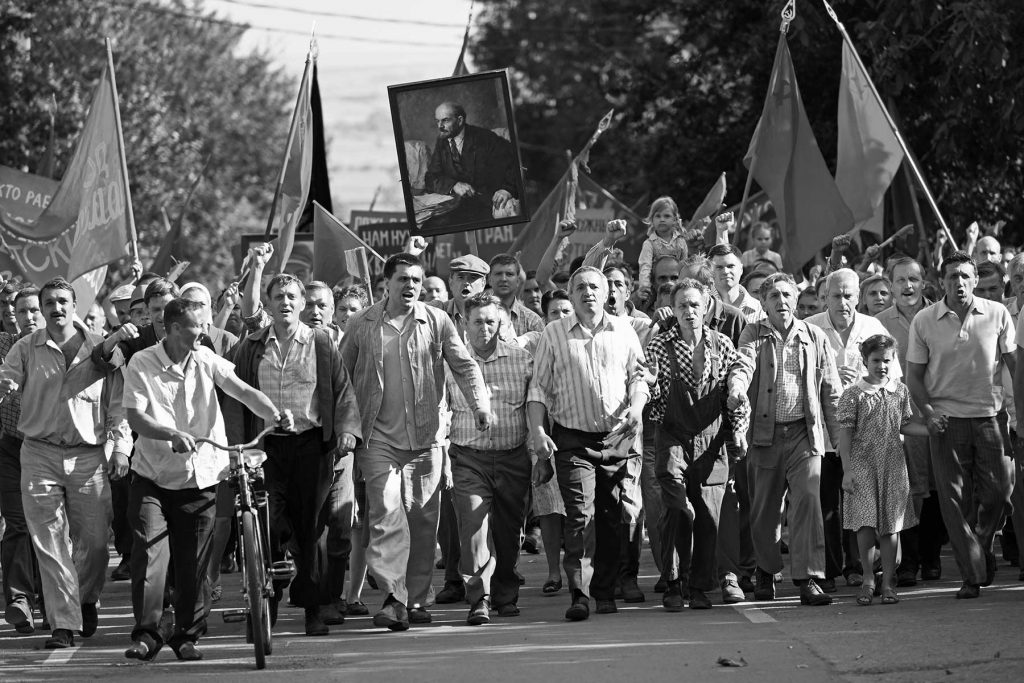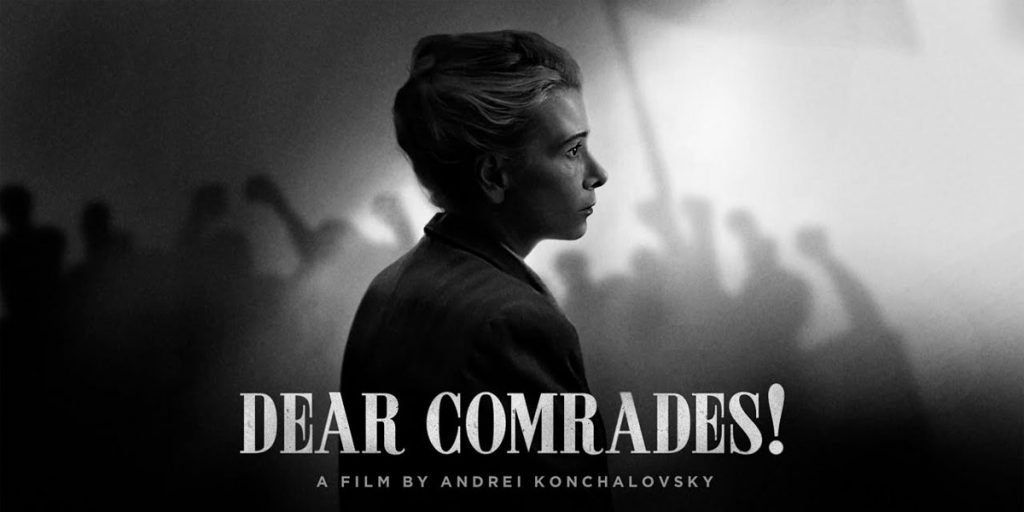Dear Comrades! memorializes a tragic chapter in Russian history through the story of a devout communist reckoning with the human cost of a repressive state.
On June 2, 1962, a strike at a train factory in the Russian city of Novocherkassk turned violent when Soviet soldiers opened fire on unarmed workers, killing 26. Burying the dead in unmarked graves and making hundreds of arrests, the KGB quickly covered up the massacre and nothing was officially reported until an investigation in 1992. This dark and tragic event is memorialized on the screen in Andrei Konchalovsky’s new feature Dear Comrades! (Дорогие товарищи!), where this violent act and its cover-up forces a rigid idealist to confront her political convictions as she reckons with the human cost of the totalitarian state she lives in and serves.
A World War Two veteran and city committee official, Lyuda Syomina (Julia Vysotskaya), is a fiercely devoted Communist Party member who dreams of a return to the days of Stalin. Her routine life is suddenly turned upside down by two startling events: her daughter Svetka (Yuliya Burova) running away from home and a strike at the Novocherkassk Electric Locomotive Plant. Thousands of workers protesting food shortages and unsafe working conditions march through the city streets, overwhelming the local administrative council. Soon, the army and KGB are called in to quash the strike and tanks roll in while spies photograph the protestors. While evacuating the committee headquarters, Lyuda sees a sniper watching the crowd as they prepare to overtake the building, and as soon as the first shots are fired, the army begins shooting at the protestors.
Fleeing the massacre, Lyuda desperately searches for Svetka, who is participating in the protest. As she watches the harrowing scene unfold in the city square, Lyuda witnesses the shocking brutality of the state and encounters a few close brushes with death. After the massacre ends, political leadership is aghast at what has happened and the KGB begins a cover-up, forcing surviving witnesses and medical staff to sign secrecy pledges and making arrests. Navigating through a city under curfew and the sinister eyes of the state, Lyuda continues her search for Svetka and questions her deeply held beliefs about her devotion to a state that carelessly murders its own people and covers up their deaths.

Dear Comrades! frequently recalls Costa-Gavras’ Missing in its portrait of a parent’s idealism crumbling after an act of political violence, government cover-ups, and personal tragedy. Like Jack Lemmon in Gavras’ 1982 film, Julia Vysotskay imbues Lyuda with a confident sense of political pride that soon falls apart, perfectly capturing all the conflicted emotions of her character’s transformation with startling vulnerability as her fierce beliefs are suddenly shattered right before her eyes. Konchalovsky and co-writer Elena Kiseleva wisely ground the story through this lens, creating a compelling human drama not only about the event of the Novocherkassk massacre but also about reckoning with the cover-up and hidden aftermath, posing a damning conclusion that some injustices cannot be fought. It’s a striking story supported by its powerful lead performance and a sharp screenplay, although unfortunately its ending seems to take away some of its power.
Disillusioned by contemporary period films that look artificial, Konchalovsky strove for an authentic look and feel while making Dear Comrades!. Apart from Vysotskay, he cast the rest of his film with non-professional actors and actresses to avoid recognizable faces. Particularly memorable are Sergei Erlish as Lyuda’s amusing grandfather who dresses in his old army uniform (a forbidden act) and Vladislav Komarov as the cynical and crafty Loginov, a KGB officer who helps Lyuda in her search for Svetka. Inspired by post-war Soviet films of the 60s, Konchalovsky also aimed for an authentic visual approach, shooting his feature in black and white and in a 1.33: 1 aspect ratio. The film’s visual compositions, often meticulously framed, retain a realist look and the impressive production design of apartment and office interiors and city exteriors bring the setting to life.
The square aspect ratio is an inspired choice, giving the film a photographic look to highlight the sense of peering into the past but only seeing these images from a particular vantage point since so much happens offscreen. This seems most evident during the massacre scene, where much of the event is unseen as we follow Lyuda as she navigates through the chaos of the fleeing crowd. While this approach works to convey Lyuda’s shock at the senseless violence being committed around her, we don’t quite grasp a sense of scale of the event as it happens, and it all happens a bit too quickly, even feeling a little staged. Similarly, the sounds of gunfire seem a bit muted, which take away from the immediacy and immersion of the moment.
Dear Comrades! is very much a film of small, nuanced details that create effective worldbuilding beyond its carefully crafted cinematography and detailed production design. Scenes of roadblocks, escapees being shot, secrecy pledge signatures, and arrests all highlight the sinister measures of the Soviet government to cover up the massacre. Particularly chilling is a conversation where one government official mentions that the blood cannot be washed off the city square and the easiest solution would be to pour new asphalt on top. It’s moments like these that show us the terrifying depths of this totalitarian architecture, especially as we witness Lyuda’s inner conflict as she grapples with this system.
In a revealing moment, Lyuda expresses her disbelief about the cover-up to Loginov, and he tells her: “These people have to be forgotten”, and that the two of them “shouldn’t even be talking about this.” When she asks how she can forget about all of this, he reminds her that they “can’t remember, can’t talk about it. That’s what the pledge of secrecy is for.” At its core, Dear Comrades! is a story about memory—Lyuda’s reckoning with the memory of a grave injustice while being ordered to forget it, and for us, preserving the memory of a tragic event that must not be forgotten.

